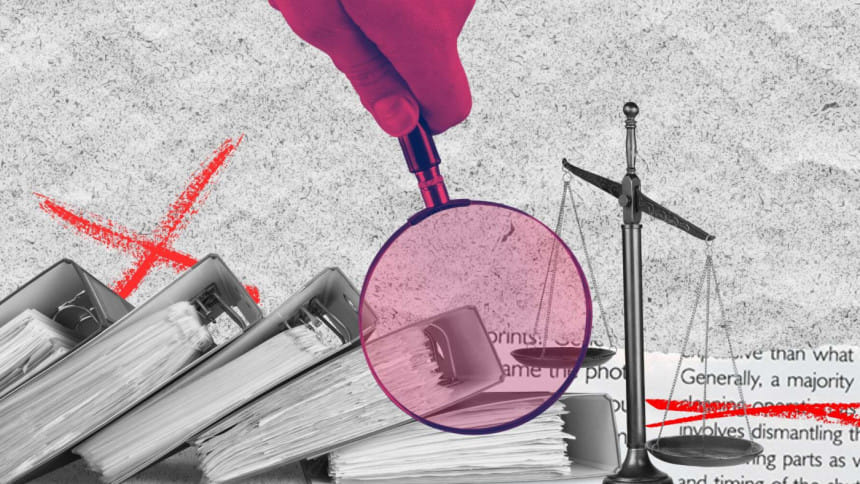The urgent need for an Ombudsman in Bangladesh to enhance transparency and democracy

Bangladesh stands at a critical juncture, grappling with a political crisis that threatens the very foundation of its democracy. The resignation of Sheikh Hasina, amidst massive protests and widespread violence, underscores the urgent need for mechanisms that can restore public trust in governance. One glaring omission from Bangladesh's political landscape is the absence of an Ombudsman—a constitutional institution designed to uphold transparency, accountability, and democracy by investigating whether or not administrative officials are legally exercising their jurisdictional powers.
The Constitution of Bangladesh, adopted in 1972, discusses the Ombudsman under Article 77. This article does not mandate Parliament to establish the office of Ombudsman but rather leaves the decision to Parliament's discretion and wisdom. However, Section 3 of The Ombudsman Act 1980 clarifies that Parliament has indeed made the establishment of the Ombudsman office mandatory by using the word "shall." This legal framework outlines the Ombudsman's functions, powers, and responsibilities, including the authority to investigate actions taken by ministries, public officers, and statutory public authorities. Yet, despite the legal framework being in place for over four decades, no Ombudsman has ever been appointed. This failure to operationalise the office deprives citizens of a critical tool for holding public officials accountable and addressing grievances related to governance.
Globally, the Ombudsman institution has proven effective in enhancing transparency and accountability. Sweden, where the Ombudsman institution originated in 1809, serves as a model. The Swedish Ombudsman oversees public authorities, ensuring compliance with laws and regulations, and can investigate complaints and prosecute officials. New Zealand's Ombudsman, established in 1962, investigates complaints against government departments and agencies, often leading to significant reforms. India's Lokpal and Lokayuktas Act of 2013, and South Africa's Public Protector, also demonstrate the potential impact of an Ombudsman in curbing corruption and ensuring accountability.
Implementing the Ombudsman institution in Bangladesh could have transformative effects. It would provide citizens with a formal channel to voice grievances and seek redress, potentially reducing public discontent and unrest. Additionally, the Ombudsman could serve as a check on the executive branch, deterring corruption and abuse of power, and strengthening the rule of law.
The resignation of former Prime Minister Sheikh Hasina plunged the country into political uncertainty. The protests and violent clashes that took place in the days leading up to her resignation were symptomatic of deep-seated frustrations with the previous system, where public trust in government institutions had eroded over time. After the resignation, Dr Muhammad Yunus took the oath as head of Bangladesh's interim government on August 8, facing the daunting task of stabilising the nation and restoring public confidence. The new leadership is well-positioned to spearhead efforts to establish the Ombudsman institution. Leadership at this time is crucial in navigating the challenges posed by the current political crisis. The new government must prioritise transparency and accountability, addressing the root causes of public discontent.
The government should make a public declaration of its intent to establish the Ombudsman office, emphasising its role in restoring transparency and democracy. This should be followed by allocating the necessary resources to operationalise the institution. The Ombudsman Act of 1980 may require updates to clarify the Ombudsman's jurisdiction and powers, ensuring it is robust enough to address contemporary governance challenges.
The new government should lead efforts to amend the Act to reflect current realities. The government should establish a non-partisan committee to oversee the appointment of the Ombudsman. This committee should include representatives from civil society, the judiciary, and other independent bodies to ensure the Ombudsman is impartial and capable of carrying out their duties effectively. The government should launch a campaign to educate citizens about the Ombudsman's role and how to file complaints. This will be crucial in building public awareness and trust in the institution. Civil society organisations should be involved in the establishment process, providing input and supporting citizens in accessing the Ombudsman's services. This will help ensure the institution is responsive to the needs of the people. The government should seek technical assistance from countries with successful Ombudsman institutions. Additionally, the Ombudsman's office should be subject to regular monitoring and evaluation to ensure it meets its objectives.
Unlike previous administrations, which failed to prioritise the establishment of the Ombudsman, the current government has a unique opportunity to correct this oversight. The previous governments were often criticised for their reluctance to limit executive power and their failure to implement key constitutional provisions, including the Ombudsman. This inaction contributed to growing public dissatisfaction and weakened the checks and balances necessary for a functioning democracy.
In contrast, the current government, focused on stabilising the nation, has both the opportunity and the moral imperative to establish the Ombudsman. By doing so, it can set a precedent for future governments, ensuring that transparency and accountability remain at the forefront of governance.
As Bangladesh navigates through this period of political uncertainty, establishing an Ombudsman offers a pathway to greater transparency, accountability, and democracy. The constitutional provision under Article 77 and the legal framework of the Ombudsman Act provides a solid foundation. The government must move beyond legal formalities and take concrete steps to operationalise the Ombudsman.
By learning from global examples and addressing the challenges ahead, Bangladesh can create a governance system that is more responsive to citizens' needs and better equipped to uphold justice and fairness. This will restore public trust and lay the groundwork for a more stable and democratic future.
Muhidul Islam is a student in the Department of Law at Southern University Bangladesh.
Views expressed in this article are the author's own.
Follow The Daily Star Opinion on Facebook for the latest opinions, commentaries and analyses by experts and professionals. To contribute your article or letter to The Daily Star Opinion, see our guidelines for submission.

 For all latest news, follow The Daily Star's Google News channel.
For all latest news, follow The Daily Star's Google News channel. 











Comments